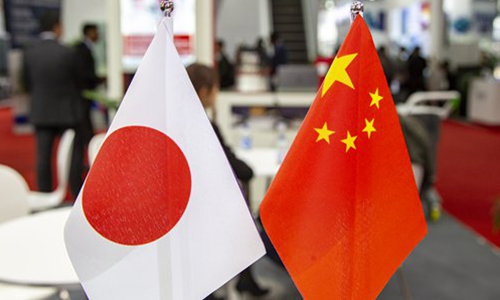HOME >> OPINION
Narrow minds hinder cooperation between China, Japan
By Mu Lu Source:Global Times Published: 2020/1/20 21:38:40

Photo: IC
China-Japan relations are entering a new era. Both governments have made positive gestures to advance their ties.However, some Japanese are overanxious about China's deepening cooperation with Asian countries, such as Myanmar, saying Japan should be vigilant about China. This is clearly not in line with the improving China-Japan relations.
A Japanese foreign ministry official said while Laos and Cambodia are increasing their economic reliance on China, Myanmar will remain the only bridgehead of Japan in Southeast Asia, according to an Asahi Shimbun report on Saturday.
The remarks reflect a zero-sum mind-set, which is out of some Japanese officials' deep-seated attitude of neutralizing China's rise. It also showed their misunderstanding of China's policy of development.
China has been focusing on development while strengthening relations with surrounding countries. It doesn't aim to replace anyone but rather to develop relations with other countries based on the principles of common development and mutual benefit.
As China grows stronger, it will expand cooperation with some countries and deepen bilateral ties. This is natural. China believes development and cooperation should be inclusive. Therefore, China is deepening cooperation with Myanmar because it is beneficial for the two countries, not because China wants to drive away any other country's influence in the Southeast Asian country.
From this perspective, Japan should treat China's rise rationally. Japan's current foreign policy toward China still has strategic vigilance against the latter as its main focus. Although Tokyo hasn't blindly followed Washington's Indo-Pacific strategy, it is being affected.
Nonetheless, Japan should be aware that cooperation with China is a better choice that benefits both, and that their cooperation can be carried out on the international stage.
The Eastern Economic Corridor (EEC) smart city initiative of Thailand is a development project involving collaboration with China and Japan, the Bangkok Post reported in May 2019.
Thai Deputy Prime Minister Somkid Jatusripitak said the concerted support of China and Japan in the EEC is meaningful for building the investment climate in Thailand and boosting investors' confidence in overall EEC development, the Bangkok Post reported.
This case shows that the joint work of China and Japan - which regional countries welcome - can benefit not only both of them and the development of Asia, but also global stability.
During the 15th China-Japan Strategic Dialogue that kicked off on January 14, Vice Foreign Minister Le Yucheng said that in the face of the new era and major changes in the world, China-Japan relations have created important opportunities for development.
However, strategic mutual trust between the two countries cannot be established within one or two days. It requires both countries to meet each other halfway, and the most important thing is that both sides should cooperate. In the meantime, the Japanese side should be more vigilant about possible obstructions by the county's right-wing forces.
The EEC has proven that China and Japan are able to jointly promote regional development. They are capable of internationalizing the mutually beneficial model that also benefits third parties, boosting development throughout Asia.
High-level interactions between China and Japan have been frequent in recent years. As President Xi Jinping said in his December meeting with Japanese Prime Minister Shinzo Abe, the two countries should "maintain strategic resolve and adopt a forward-looking vision that takes the overall situation into consideration."
It is believed that the two countries will seek common ground while shelving differences and make efforts to take their relationship to the next level.
Posted in: OBSERVER